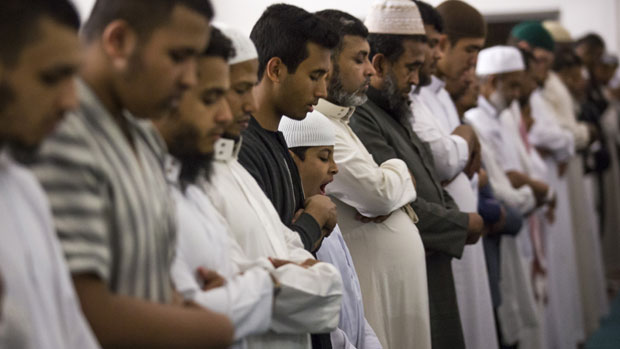Anti-Muslim hate crimes increase in England and Wales
Attacks against Muslims have 'skyrocketed' since murder of Lee Rigby, new study shows

A free daily email with the biggest news stories of the day – and the best features from TheWeek.com
You are now subscribed
Your newsletter sign-up was successful
There has been a sharp rise in anti-Muslim hate crimes in England and Wales since the murder of soldier Lee Rigby last year, a new study has found.
The report comes less than a month after police revealed that the murder of a Saudi Arabian woman in Colchester could have been religiously motivated because she was wearing an abaya, Al Jazeera reports.
While recent police and government reports show that hate crime incidents in general are decreasing, Muslim are now more likely than any other minority group to be victims of religiously or racially motivated hate crimes.
The Week
Escape your echo chamber. Get the facts behind the news, plus analysis from multiple perspectives.

Sign up for The Week's Free Newsletters
From our morning news briefing to a weekly Good News Newsletter, get the best of The Week delivered directly to your inbox.
From our morning news briefing to a weekly Good News Newsletter, get the best of The Week delivered directly to your inbox.
The study, conducted by Tell MAMA, an organisation which monitors anti-Muslim attacks, and academics at Teeside University, showed that attacks "skyrocketed" after Lee Rigby's murder.
"At this time, many [Muslims] in Britain felt frightened and victimised," the report concluded.
What are the figures?
The study recorded 734 incidents over a ten-month period between 2013 and 2014. These included 23 cases of assault, 13 cases involving extreme violence, 56 attacks on mosques and hundreds of cases of online abuse.
A free daily email with the biggest news stories of the day – and the best features from TheWeek.com
In the weeks after Lee Rigby was murdered, hate crimes against Muslims rose by almost 400 per cent.
Why has there been such an increase?
Researchers claim the murder of Lee Rigby was the initial "trigger" for a surge in anti-Muslim hatred in 2013. The study also confirmed that 40 per cent of attackers had links to far-right anti-Muslim groups such as the English Defence League and Britain First, which are rapidly growing in popularity.
Despite the controversy surrounding the group, Britain First recently became the most popular political group on Facebook, reaching millions of people a week.
This is as example of "cumulative extremism", say researchers, "whereby one form of extremism can feed off and magnify other forms."
Who is being targeted and how?
Women wearing traditional Islamic dress are most likely to be victims of such hate crimes, the study found.
Victims reported being spat at, having their burkas pulled and ripped, having lit cigarettes thrown at them, being verbally abused and physically attacked.
Mosques, madrassas and Muslim community centres were also targeted, with attacks ranging from Islamophobic graffiti to criminal damage and arson.
The research also included hundreds of instances of persistent online abuse.
How should the problem be addressed?
Underreporting remains a significant challenge, say the researchers. The study highlights the need to encourage people to come forward, as only 17 per cent of victims who had contacted the organisation also reported the incident to police
Matthew Feldman, co-author of the report, told Al Jazeera that the figures "highlighted a worrying lack of trust in the police in Muslim communities."
In May, the government issued a revised action plan on hate crime, which outlined ways it would tackle attacks against Muslims. These included the first ever cross-Government working group on anti-Muslim hatred and "regional road shows" which engage with local communities on how to tackle Islamophobia.
"We are making real progress in tackling hate crime, but there is still much to do to confront the hatred and hostility that still exists in our society", said the minister for crime prevention, Norman Baker.
-
 The Olympic timekeepers keeping the Games on track
The Olympic timekeepers keeping the Games on trackUnder the Radar Swiss watchmaking giant Omega has been at the finish line of every Olympic Games for nearly 100 years
-
 Will increasing tensions with Iran boil over into war?
Will increasing tensions with Iran boil over into war?Today’s Big Question President Donald Trump has recently been threatening the country
-
 Corruption: The spy sheikh and the president
Corruption: The spy sheikh and the presidentFeature Trump is at the center of another scandal